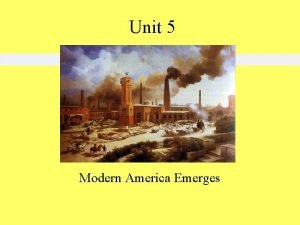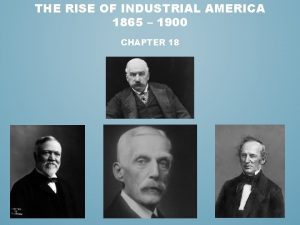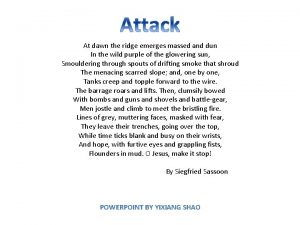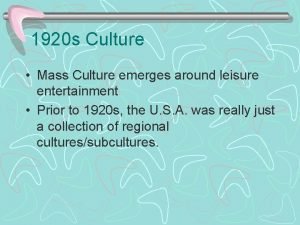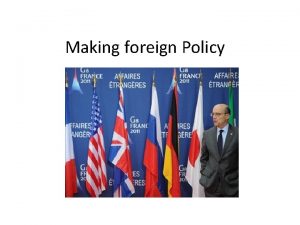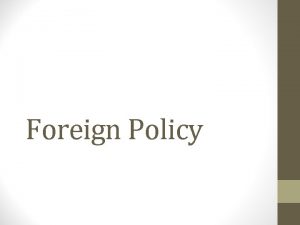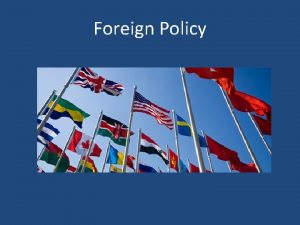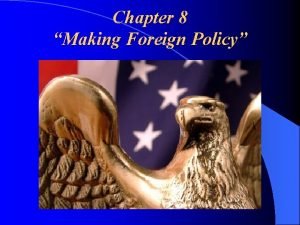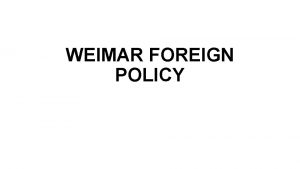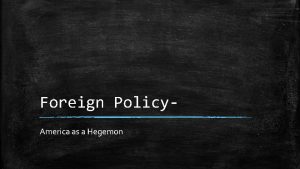A New Foreign Policy n 1900 America emerges







- Slides: 7

A New Foreign Policy n 1900 -America emerges as a world power. Mc. Kinley wins the presidential election, and is assassinated one year later. Teddy Roosevelt assumes the presidency.

The Panama Canal Why build it? n The Spanish-American War brings to light the glaring fact that there is a need for a shorter route between the Pacific and Atlantic Oceans. n n n The Isthmus of Panama was an ideal location to build a canal to connect the two Oceans. 1879 -A French company buys a 25 -year Concession( a concession is a grant for a piece of land for a specific purpose) After ten years the company ends the project because of yellow fever and mismanagement of the operation 1902 -Congress buys the rights for 40 million under the Spooner Act Under the Spooner Act, the U. S. is forced to negotiate with the Colombian Government for the use of the land. These negotiations went nowhere because the Colombian's were waiting for the concession to run out so they could up the price.

n n The Concession would run out in 1904 so then the Government could then offer it to the highest bidder. 1903 - A Panamanian revolt takes place against Columbia, the U. S. encourages revolt, then when it happens they intervene, bringing warships to help Panama. n n n As a thank you, the Panamanians sold the U. S. a permanent grant (10 million) for a ten mile-wide strip of land to build a canal. This land would be in complete control of the U. S. 1904 -1914 Construction of the canal, was twenty-three million dollars under budget. 1921 -After receiving much criticism and ill will from Latin America over the illegal means in which the U. S. acquired the land, Congress votes to pay Columbia 25 million.

Roosevelt’s Big Stick Diplomacy n “Speak softly and carry a big stick, you will go far” n The U. S Navy is what Roosevelt felt his “big stick” was. Roosevelt threatened to use his navy againstability Dec. 1904 -1905 Roosevelt Corollary, which added to the Monroe Doctrine , said that the U. S. does not what anymore territory. n n n He only stated that the U. S. wished that neighboring countries “to be stable, orderly, and prosperous” A corollary is a extension of a previously accepted idea If they weren’t then the U. S. would have to exercise “International Police Power. ” This means that the U. S. would intervene to prevent the Intervention of other world powers. In Asia Roosevelt acts as a peacemaker to keep the open door policy intact.

The Russo-Japanese War n The Russo-Japanese War (1904) threatens this policy. n The Russo-Japanese war was a war between Russia and Japan, and Roosevelt feared it would hurt U. S. trade with China n Roosevelt and the U. S were concerned over how strong the Japanese military was. n Roosevelt organizes the peace talk for the war and wins the Nobel Peace Prize, all the while saving the U. S. trade in China

Foreign Policy After Roosevelt n n n Taft and Dollar Diplomacy 1908 -William Howard Taft becomes President. He was not as aggressive as Roosevelt, but still determined to keep the open door policy with China and keep Latin America stable Dollar Diplomacy- known as “substituting dollars for bullets” this policy increased American investment in foreign markets. Dollar Diplomacy was not that successful, ex. Economically in China and Socially in Latin America One thing that Taft and Roosevelt had in common was the idea of the “open door to China” Taft’s main goal foreign policy was economic investment. He felt that this was easier and more practical than military intervention.

Wilson and the Mexican Revolution n n 1911 - Mexican Revolution forces Porforio Diaz to resign, and new President Francisco Madero promised a Democracy…. . but it failed. 1913 -Madero is overthrown and killed by General Victoriano “the Butcher” Huerta The U. S. must respond to this illegal action. Wilson moves away from Taft’s Dollar Diplomacy to apply moral and legalistic standards to foreign policy decisions. These decisions result in a bloody and complex confrontation with Mexico, and Wilson attempts failed and these battles where many lives were lost soured the relationship between the U. S. and Mexico for years to come.
